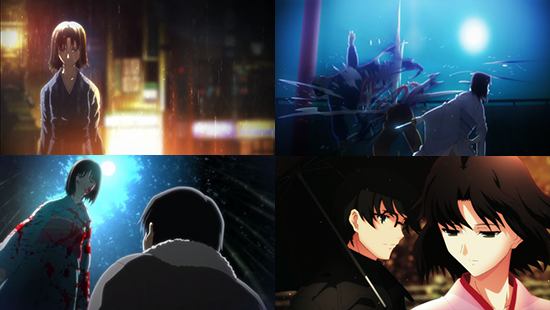
Written by Robert Frazer on 24 Nov 2014
Distributor MVM Entertainment • Certificate 18 • Price £79.99
Poor old Studio DEEN. Back during the Noughties they crested on a wave of renown by re-awakening western audiences to the visual novel with their anime adaptation of Fate Stay/Night, the sensational experience which could be said to be one of the break-outs which rehabilitated interactive fiction in the west. Even if the VN itself has never had a commercial release in English, many of its supplementary materials have been and the widely-circulated fan-translations of Fate Stay/Night were symptoms of the growing online interconnectivity of the anime & manga market that helped to revive interest in the VN medium, rustling the message-boards with the susurration of life that's pumped blood to everything from the comedy courtroom of Ace Attorney to the postmodern pigeon-fancying of Hatoful Boyfriend. Now however Studio DEEN can only watch from the sidelines with its own legacy trashed as Ufotable enchants us with its own prettier, shinier, smoother, fancier remake of Fate Stay/Night currently streaming on Crunchyroll, and wins the drama plaudits for the grittier, darker, more operatic Fate/Zero prequel series that was released to DVD and Blu-ray earlier this year.
Even Ufotable's current popularity had to be built up from somewhere though, and those of you who have been fascinated by their style now can see how that style evolved by looking back to The Garden of Sinners, the beginning of the studio's long-term collaboration with software house Type-Moon. The Garden of Sinners was one of the earliest works of writer Kinoko Nasu and artist Takeshi Takeuchi, who would later go on to form the core of Type-Moon, and after some quite severe delays (the original release of this collection in the USA was way back in 2011, and this review itself has had to stay in a holding pattern for a month due to a production issue putting back the UK release) we finally have an opportunity to experience it for ourselves. Has it been worth the wait?
Mikiya Kokuto is to all outward appearances a regular, if quiet, high-school boy. That quietness though is from the intensity of a prodigal analytical mind which sees his police-detective cousin regularly bringing his work home to gain tips from Mikiya's insight. Lately though, Mikiya has found something more interesting to engage his perceptive eyes - Shiki Ryogi. This girl, always clad in a kimono, is similarly quiet - but instead of Mikiya's introspection, it's cold aloofness. Shiki is the heiress to a yakuza clan that lives in an ornate traditional mansion in the forests outside of town, but Mikiya doesn't see its walls as any obstacle and patiently starts to break down the divide between him and Shiki.
Then something else intrudes on his attention, as the town is terrorised by a spree of brutal slayings. A dismembering monster of a serial killer is on the loose, and it's baffling the police. The only lead is that someone in a kimono has been sighted near the crime scenes... it would seem to be too obvious for it to be a link but as Shiki herself freely admits to Mikiya, that may not be the case. The Ryougi family is traditional in more ways than clothes and home decor, and Shiki has been subjected to ancient magics and sorceries that have inflicted on her a split personality - like the Taoist spiral of yin and yang, there's a cool, feminine Shiki with which Mikiya can interact, and a hot, masculine Shiki that is driven only by bloodlust. Shiki claims that she's the killer, but Mikiya is unconvinced by her confession - in the tempest of her conflicting personalities, is she actually a murderer or has she only convinced herself that she is one? Through his determination to prove Shiki's innocence even though Shiki herself disbelieves it, Mikiya is beginning to turn his long gaze past the common life he's lived and plunge into the world behind that backdrop, a mysterious realm of spells and demonology where tempestuous figures seek to remake the world - and have the power to do so. Not least of them is Shiki herself with her "Mystic Eyes of Death Percpetion", the magical ability to perceive the life-threads of beings and objects alike and so end any fight in a single cut... and possibly slice apart the very Earth. When the crisis comes, which Shiki will be the one holding the knife?
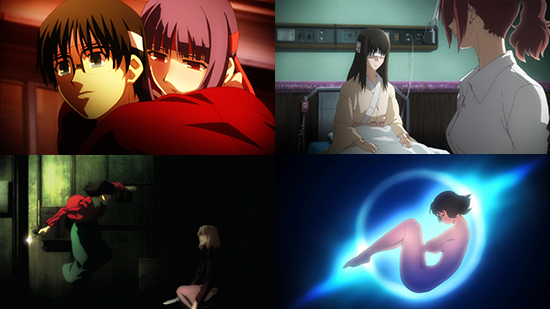
The Garden of Sinners was originally known as Kara no Kyoukai, which translates to "Boundary of Emptiness" with "Garden of Sinners" added on as a subtitle. I agree with the decision by Aniplex USA and MVM Entertainment to focus on the subtitle for the English release as it's much more dramatic. The story is the origin-point of what has come to be called the "Nasuverse", the broad interconnected mythology of author Kiniko Nasu's Tsukihime and the ever-increasing Fate Stay/Night franchise. Originally made together with illustrator and long-time collaborator Takeshi Takeuchi as a doujinshi light novel in 1998, before the creative partners even established the Type-Moon studio in 2000, The Garden of Sinners is currently described as a "parallel universe" not in continuity with their other works - nonetheless anyone who is even a passing fan of Type-Moon will find the setting of Garden of Sinners immediately familiar. Shiki's "Mystic Eyes of Death Perception" are the same supernatural power used by a different Shiki in Tsukihime. It's also here in The Garden of Sinners where we see the first conceptual germination of the complex systems of magic and magecraft that sprawl out, elaborate and convolute into great structures throughout the entirety of Fate, particularly magicians' obsession with tapping the mystical "Root" or "Origin" of all things and all powers that's also the driving motivation for many of the belligerents in that franchise's Holy Grail Wars. Garden of Sinners however does not get bogged down in the outright bureaucracy of pseudo-RPG ranks and classes that encumbers those stories, thankfully, so Type-Moon veterans can still enjoy the references while newcomers don't need to have an annotated Wiki printout on their laps in order to follow what's going on.
This release includes the original 2007-2009 cycle of seven movies retelling the Garden of Sinners novels, plus the eponymous 2011 OVA "Boundary of Emptiness", a coda which draws together the threads of mind, body and soul that ran through the main series. As substantial as the package is though it's not quite a Complete Collection, as it doesn't include the "Future Gospel" sequel movie and the "Extra Chorus" gaiden that came out last year. This release is also missing the entry "Gate of Seventh Heaven", but as that was largely just a clip-show digest of the series to act as a plot recap in advance of the final main movie, it's not a critical loss. While it's disappointing not to have the full set, it is still nonetheless the same amount of video content as was in Aniplex USA's releases along with its deluxe-pack supplementary materials too, at a significantly cheaper price.
Ufotable has developed a reputation for sumptuous art in its Fate adaptations, and even though The Garden of Sinners is an earlier work it doesn't at first glance mean that it's undeveloped. Background images are extremely detailed, even photorealistic, and there is superb use of colour from start to finish, from the Brutalist concrete shadows of the first episode's ruin to the contrast of crisp precise clean white snow around the beaming gradients of orange fog of the final OVA. While they're superficially gorgeous though they also seem strangely desolate, outside of rare crowd scenes usually empty of everything except two principals with the camera pulled far back and in very odd perspectives that make the characters look tiny in vast spaces. It's probably meant to be meaningful - everyone is separated by gulfs of loneliness in an inimical world, etc etc - but most of the time it just looks weirdly and off-puttingly disproportionate. On a smaller scale though visual effects for the magical powers look excellent - the fairies of the sixth movie in particular having an engagingly unusual design. The warped, distorted sight of Shiki's "Mystic Eyes of Death Perception" is also truly horrifying and really convinces you of Shiki's revulsion when she first experiences the activated ability - usually in anime the hero rejects his fantastic powers because of some sullen stunted short-poppy concession to merely be "normal", but in this case you can properly appreciate that it's an awful and impossible affliction and that no-one could endure it alone. There is a fair amount of CGI used in The Garden of Sinners too but it fits in well - beyond flat textures on a couple of buildings and a blocky edge to Mikiya's jaw during a pan around his body in the OVA, the CGI integrates closely with the drawn animation and is used well for dynamic tracks and pans, particularly in the final movie as it chases Mikiya during a sprint through the alleyways.
The CGI is absolutely necessary as well because without it it would have been a tall order indeed to depict some truly wild action scenes. With each blow and clash individually crafted (they don't just vanish into a cloud of flailing limbs) along with crash zooms, fast tracking, and in-your-face shots as if a GoPro has been mounted on someone's shoulder, or at other times spiralling and pirouetting about as though it's a third fighter intervening in the duel, these have definitely earned their reputation as an exhilarating highlight of the series. There's plenty of limb-lopping bloodletting too, although in most scenes the gore has this strange off-colour pinkish consistency to it. While the fights are certainly very impressive, you should bear in mind that if you are buying The Garden of Sinners only on the strength of its combat, that these confrontations are only brief squalls and flurries surrounded by many long, still, static scenes - and the battles themselves are still regularly interrupted for dialogues. The fight scenes, as dramatic as they may be, are rarely more than two or three minutes at best out of a sixty-minute or longer movie. This is definitely not an action anime.
Action then is only a limited portion of Garden of Sinners, but you need many flowers to populate one. Do its other dramas also blossom?
There are two pillars for these dramas to curl around. The first is the event-driven plot that centres around the malign machinations of a mysterious mage, Soren Araya, who has designs on taking control of Shiki and her unique "Mystic Eyes of Death Perception" to further his own arcane goals. The second is the theme-driven character founded on the central question of Shiki's true identity: whether it is the male or female personality which represents her true self - or both, or neither - and given her ambiguous state where the responsibility and agency for her murderous impulses lies. It's these components of the second pillar which truly are at the heart of The Garden of Sinners and addressing the really rather frightening enigma of this presence that's invaded our heads that we blithely call consciousness is the real objective of the story. It's a universal and fundamental question, and can these films articulate an answer?
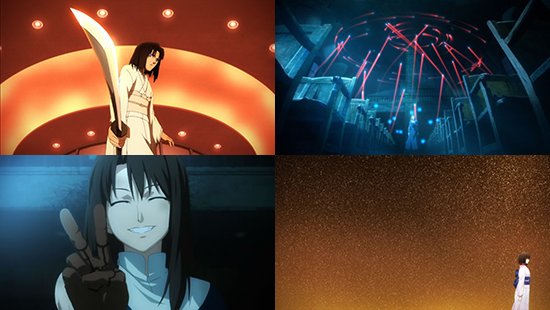
Shiki's "Mystic Eyes of Death Perception" are a most remarkable realisation of Combat Philosophy - it feels a bit like Dresden Kodak's "Dungeons & Discourse" webcomics. with her reading of the cosmic blueprints of every structure she beholds, it's as if she's weaponising the Platonic Theory of Forms! As much as she beholds the atemporal Eidos though, Shiki is still very much part of this world, not least in her material priorities of product placement as she subsists on almost nothing other than Volvic bottled water and Haagen Dazs ice-cream! Well, Shiki likes the same sweets as Yotsuba so she's obviously a girl with taste...
Shiki's ability to always hit the weak spot for massive damage and turn any fight into a one-hit kill might seem to be tension-deflatingly overpowered, but it is moderated somewhat in that while she can see where she needs to aim, she still needs to actually land the blow for it to be relevant. It's also limited in that she can only ever bring a knife to a gunfight, although all of the enemies who attack her from range, particularly the two telekinetic mages she fights, choose to snap an arm instead of, you know, her neck. It is very sporting of them.
The broken nature of Shiki's abilities becomes absolutely ludicrous in the climax of the third movie where it's revealed that Shiki's mystic eyes apply to all things and so can tell her how to save someone's life by stabbing out a disease. You have to wonder why instead of all this angsting over the morality of murder she doesn't just walk into a hospital, up-end a cutlery drawer in the middle of the cancer ward and proceed to enjoy fame and fortune for all her days as the greatest medic of all time by killing people back to life. I suppose that it's the elephant in the room for a lot of fantasy stories: if, say, you can summon floods of water with just an incantation and a few hand motions... never mind only ever invoking it once in a while to wash away an enemy, why aren't you selling your services to drought-stricken Africa instead? I wonder if all those magical crooks arraigned in Wizard Barristers earlier this year could have been done for criminal negligence if no other charge could stick. Like all the others of its ilk Garden of Sinners hopes we won't notice, and the inconsistency is just one of those assumptions for which you have to let your suspension of disbelief take the strain.
There is a credible presentation of Shiki's identity disorder. When the male Shiki personality is suppressed early in the series, appropriate time is taken to explain how there is more to this than just the female Shiki getting a bigger chunk of the headspace timeshare - the sudden silence of someone who's been with you every moment of your life is something very much like bereavement, as Shiki consciously adjusts her own personality in order to try and fill that chasm of self with the other's expressions. It does mean though that she spends a lot of time affecting a too-cool-for-school poseur pout, but the thought is there.
The question of whether or not that means her "murderous impulses" are also an affectation that she feels she ought to have rather something that her psyche genuinely needs to have remains coyly did she/didn't she right up until the final movie. This is where the morality of murder and whether Shiki truly has a killer instinct becomes urgent with the appearance of a new self-destructive serial killer who is butchering the population precisely to provoke Shiki into killing him. Unfortunately this isn't the best setup to answer these questions, and the scenario loses a lot of bite because of this - "murder" would be a lot more meaningful if the target wasn't a raving evil psychopath who's killed dozens, and if they hadn't abandoned the question of whether Shiki herself was a sadist killing for kicks then the crisis would have had much more impact. We've had this problem of inflexible Japanese incomprehension of extenuating circumstances before, in Yomi's unpardonable crime of self-defence in Ga-Rei-Zero and more recently the currently-streaming Sword Art Online II where Shino gets bullied and ostracised because she, horror of horrors, took out a felon who was about to kill her mother during an armed robbery. The fact remains that what Shiki is doing in the last episode is not "murder", it's a courageous public service that you'd probably get a medal for, so all of the weeping and wailing is just... frustrating. Have Shiki be dicing up a blameless, luckless innocent as you've been suggesting all series, and then there'll be something meatier to have a conversation about.
Nonetheless it still leads to some superbly-directed arguments between Mikiya and Shiki, particularly one where they travel to each other's apartments and then shout back at each other through the rooms' phones, an ingenious arrangement that suggests how they are each other's lifeline, but are still pawing around for it and haven't managed to grab on yet. While the story wants to be ambiguous right up until the final climax though, it really tips its hand early on multiple occasions, so the 'mystery' gets exasperating when it's so easily sussed out. I'm not altogether convinced by the philosophy her grandfather imparted to her about how you "can kill only one person in your life, any more and you'll be inhuman" - all that seems to me is to be similar inessential degrees. Perhaps the grandfather was trying to square the circle of the principle of non-violence with the fact of irregular events and giving Shiki a bit of forgivable leeway while still asserting that the act was not to be encouraged. These circumstantial particulars though mean that it can't be a general moral statement. It also leads to an important oversight in the anime where a wider knowledge of Type-Moon is proved necessary, as a newcomer watching might wonder why this "one murder only" rule is so important considering that Shiki has already taken out a number of mages earlier in the series and not had it trouble her. Shiki can hack up zombies without compunction and apparently it's not a problem to kill a mage either because their lives are valued differently to regular humans - the anime itself doesn't actually explain this to you though and I had to ask around on discussion forums about why the threat of murder in the final episode was such a big deal when Shiki had supposedly already broken it. While Shiki's line "it's only luck if I haven't killed anyone yet" is easy to sneer at for its suggestion of almost cartoonish incompetence or adolescent edginess, it does have an interesting thought behind it - even if she hasn't killed, she's still a 'latent killer'; the idea that "intent matters more than deed" is often used to excuse doing bad things for good reasons, but The Garden of Sinners quite deftly flips it over to show its logical consequence - if intent matters more than deed, then thought is indeed a crime and you can be condemned for the will even without the act.
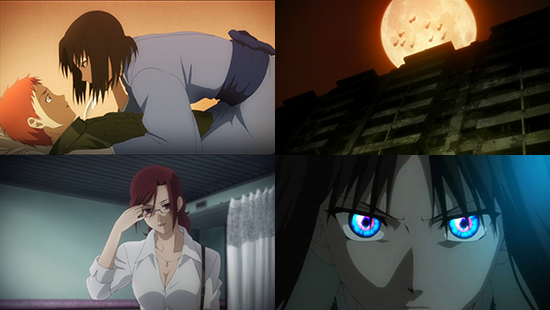
Despite all this, whether to kill or not is more important because of how Mikiya would react to it, and before all the questions of whether it's right or wrong to kill simply whether Shiki can master her emotions in order to keep her promises. It must be said that for much of the series, Mikiya is exasperating to watch. Even by the low standards set by limpid, milquetoast anime main characters in general, he really comes across as a complete and total dweeb. Bland, passive, vaguely "nice" (as if that's an achievement rather than the bare minimum of social courtesy you'd expect from anyone) and as oblivious and tone-deaf as the worst of harem leads, he's so utterly devoid of anything that could be construed as approaching a character that he remains completely sober, lucid, coherent and slightly bored even when he's tripping out on LSD. Mikiya's one single trait is his absolute abhorrence of killing, with no exceptions even if it's in self-defence or to stop a rampaging mass-murderer. It may be an ardent principle, but it's not an actual personality, and if all the insight that he can summon in seven whole movies is a banality like "killing is wrong and if you kill then you are a horrible person" then you really could have a more enlightening conversation with an Internet chat-bot. Shiki's love for this veritable vegetable seems insane. There is, however, a method in the madness; the OVA provides an interesting slant on this that I hadn't thought of during my first watch through the series which makes the resonance between the empty Shiki and the emptied Mikiya much more understandable.
The A-plot of sorceror Soren's schemes really just bookends the episodes as thin connective tendons for much of the series, but comes together as the focus of the fifth movie, "Paradox Paradigm". This movie above all the others in the Garden of Sinners sequence has acquired something of a reputation on the Internet for being a mind-bending Kafkaesque prison of lost angles and inescapable fractal walls, but really its bark is worse than its bite. I've got to be honest, it's very hard to get past the movie's new character Emiya Tomoe - while his arrival into Shiki's life makes for a pleasingly offbeat instrumental sequence that becomes something like a narrative music video, almost a jazz session of editing, his design is very distractingly similar to Fate Stay/Night's Shirou. Seriously, as petty as the complaint might be, you have to tip your head to blink past it in every scene he's in, and half the time I was expecting Saber to smash through the walls and slice up Mikiya with Excalibur. While Soren himself is an impressively imposing villain the action is harmed by some incredibly implausible twists - Touko's "contingency plan" during her confrontation with rival mage Cornelius for instance smacks rather more of "cheap asspull out of nowhere". There's an unfortunate admission by Shiki in the climax that all of the efforts of her friends to rescue her were unnecessary, which rather makes everything which preceded it rather hollow and useless. Still, the high concept of Soren's plan is intriguing and ingenious while still not difficult to follow once it's been laid out. It's obtuse more than it is complicated, mainly due to the inarticulate clumsiness of some real knuckle-dragging clunkers of lines like "You took the Supreme Ultimate into the Supreme Ultimate?"
This leads in to language used for conveying Garden of Sinners' ideas, which as you see does need to be approached with some reservations. I can understand why Aniplex baulked at giving Garden of Sinners an English dub and I can't in good conscience criticise them too hard for the omission. This is an exceptionally talky anime with some particularly dense dialogues, approaching the scale of Bakemonogatari - the OVA especially is literally a half hour-long unbroken conversation in a single scene - and it probably required a bigger investment than the potential audience could fund. It is a little disappointing though and it's something that holds Garden of Sinners back from being a genuinely premium release - had I been in Aniplex of America's shoes I would have taken a gamble on it, as the popularity of Fate Stay/Night gives it a pre-loaded audience through the Type-Moon connection that would have been engaged further by a dub. It also means that some expression is lost, particularly in Shiki's changing patterns of speech to denote her shifting personalities which here are opaque to anyone not fluent in Japanese, although the subtitles help to recapture it by referring to her various guises as Shiki, SHIKI and Shiki. The subtitles really could do with a bit more expressiveness too, because the translation as a whole is very dry, clipped and austere, and maybe rather too literal - most clearly seen in the bizarre retranslations of the episode titles: for instance, the third movie "Remaining Sense of Pain" becomes here "Ever Cry, Never Life". ...Eh? They don't even bother translating one episode name, just calling it "Garan no Dou" instead of "The Hollow Shrine". It's mainly a cosmetic issue, but these titles could have been cleaned up a bit if the main name has already been changed. Still, even if the subtitles themselves lack much vigour and style and it can sometimes feel that you're only reading a synopsis of the actual speech, they are usually quite competent in distilling the essential information (although they really do struggle with some of the more opaque parts of the fifth movies) which the Japanese voice actors themselves can emote over effectively.
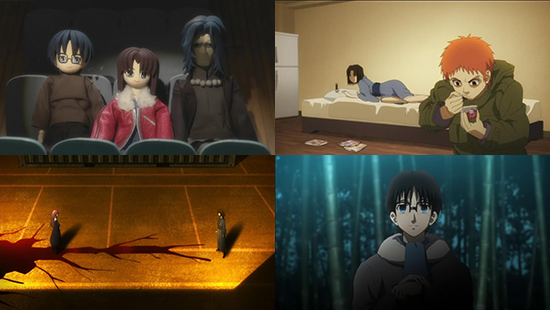
From spoken word to melodic music, the audio strengthens dramatically. Garden of Sinners has an excellent, albeit largely ambient, soundtrack with tinkling eerie creeping in the dark that swells up into sonorous strings for moments of action, suiting different moods while still retaining a consistency of theme. Especially interesting though are the closing songs of each episode - all sung by the group Kalafina, this pop-classical trio imbue each episode with an ethereal lilt. What makes them particularly special though is that while the band was created only to perform these particular songs, the strength of the Garden of Sinners score was such that Kalafina was able to use them as the foundation of an independent music career - the group still performs today, having now released four studio albums and also provided diverse songs for other unconnected anime. It's a lovely story of success to see how the anime nurtured new talent.
Despite the size of the package and sprawling nature of the Nasuverse that was spawned from Garden of Sinners, extra content is slight. Each disc of the seven movies has a "pre-show reminder" of the cinema rules, shown with stop-motion puppetry of chibi characters whose style should be familiar to anyone who's watched Carnival Phantasm or read the Take-Moon parody manga. These are light-hearted fare and it's interesting and unusual to see physical models being used - the only other anime I remember having such distinctive cuts is Panty & Stocking With Garterbelt and its exploding ghosts. Overall they're pretty good fun, although towards the end of the series even the Japanese, that most conformist of peoples, start struggling for things to wag their finger at you for - okay, I get "no smoking" (even if it tells us twice) but "don't start fires in the theatre"? Seriously? Is central heating in Japan that bad? Other than this all you have is a small collection of trailers. They're pretty fanservice-laden ones too given that my copy included Battle Vixens and We, Without Wings - I suppose a bit of knicker-flashing is a tonic to cleanse the palette after the heavy drama of the movie series that you've just watched!
This has been a long review, just as it was a long movie series, but equally you can also sum it up as the movies themselves did, in the final OVA epilogue on disc eight. Appropriately enough for a series preoccupied with the complementary dualities inherent in nature, this one OVA represents both The Garden of Sinners' potential and its problems together. That the OVA exists is a clear statement that Nasu didn't want to limit himself to the plain-faced swords'n'sorcery of fantasy and that he truly had something he wanted to say, ideas he wanted to express and philosophies he wanted to communicate through Shiki's and Mikiya's adventures. That an explanatory OVA was necessary though is also a tacit admission that he failed to do so. The Garden of Sinners is a seminal work - in the bad ways as well as the good ones. It can be fascinating to see talent in its raw, untrammelled state thrumming with untapped powers, but even the largest of diamonds needs to be cut before it can shine. This movie collection offers great action sequences and musical themes and some rewarding thoughtfulness, and even if it cannot fully articulate its dreams of bigger things, there's enough there for you to help it along if you'd like to take part.
Japanese 5.1 audio with English subtitles. Extras include "Pre-Show Reminder" cinema shorts and trailers.

Robert's life is one regularly on the move, but be it up hill or down dale giant robots and cute girls are a constant comfort - limited only by how many manga you can stuff into a bursting rucksack.
by Richard Durrance on 20 Feb 2026
by Ross Locksley on 19 Feb 2026
by Ross Locksley on 08 Feb 2026
by Ross Locksley on 25 Jan 2026
by Ross Locksley on 01 Jan 2026
by Ross Locksley on 21 Dec 2025
by Ross Locksley on 25 Nov 2025
by Ross Locksley on 24 Nov 2025